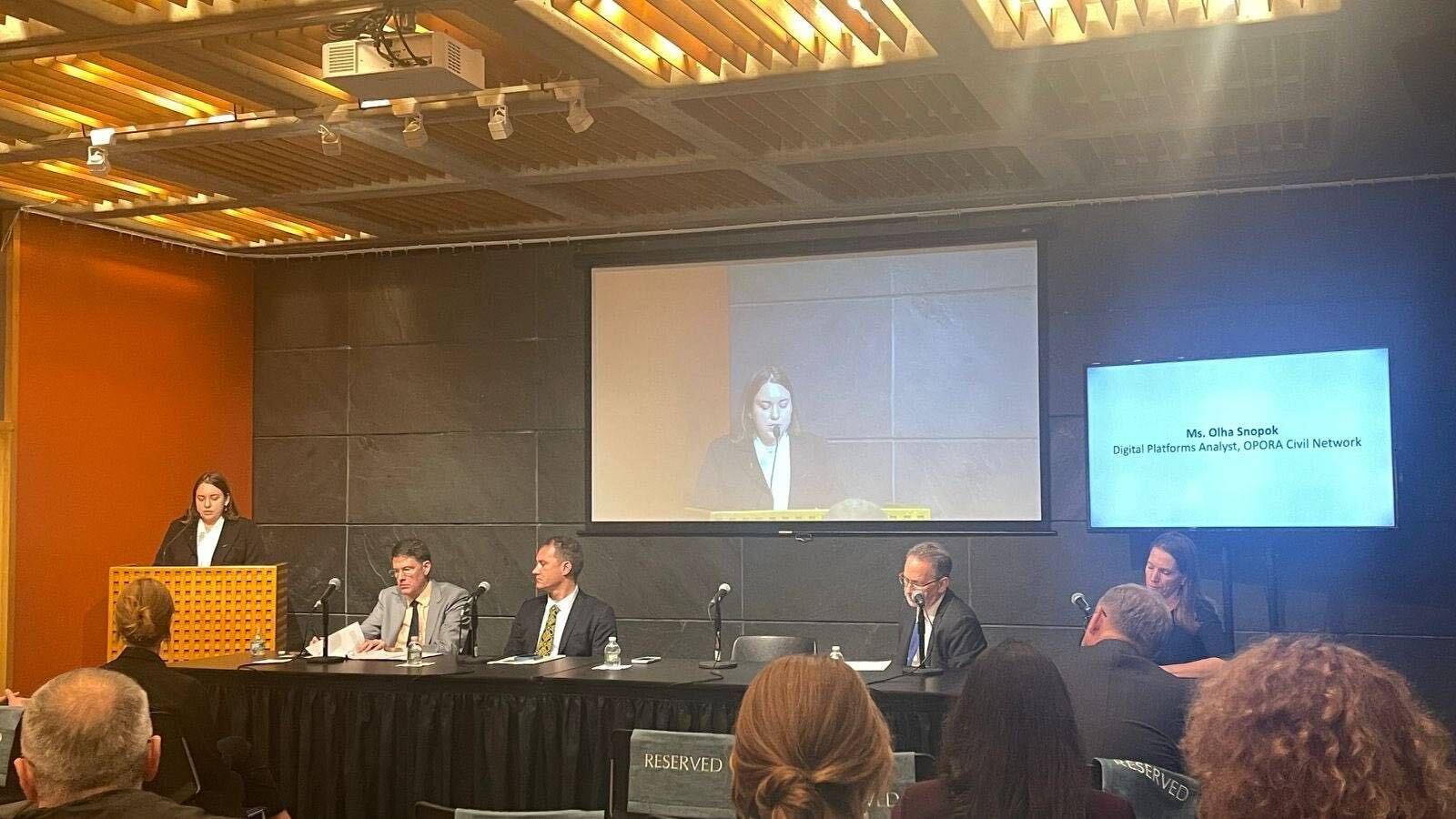OPORA analyst Olha Snopok presented a study on the impact of Russian cultural policy on Ukraine's temporarily occupied territories and attempts to influence Ukrainian identity on September 26, during the 79th session of the UN General Assembly.
Full speech:
"I want to share with you the findings of the comprehensive study that OPORA’s team recently conducted. In this research, we had a goal to describe Russian cultural policy on the temporarily occupied territories of Ukraine and their attempts to influence Ukrainian identity.
A few words about what inspired me to work on this research. I live only 15 kilometers from Bucha, which has become a symbol of the horrors that happened when Russia invaded Ukraine. I was lucky not to live under Russian occupation. However, many of my close friends experienced the occupation, and they told me that the hardest thing about being there is that you see so many horrible things that you want to scream, but you can't say a word. A lot of Ukrainians still live under Russian occupation. Through this study and this presentation, I would like to give them a voice.
The biggest mistake we can make when it comes to culture on the temporarily occupied territories is to assume that Russia's actions are accidental or sporadic.
Since 2014, when Russia launched its war against Ukraine, its key goal has been to ensure that the Ukrainian identity of every person in these territories is replaced by a Russian one. The Russian authorities realized this would not happen simply by changing flags and anthems. So, they decided that each person needed to be surrounded by a structure of institutions and narratives that would eventually force them to accept Russian identity. So they began to build such a structure.
The most precise sign of a systematic approach to any policy is the creation of a legislative basis for it. After the full-scale invasion, the Russian authorities decided that Russian cultural legislation should be enforced on the occupied territories. Also, they introduced the new law that allowed Russians to add Ukrainian cultural heritage sites to the Russian registry and allowed for the free "export" of cultural property to the territory of the Russian Federation. They also have introduced the so-called patronage in the occupied region, where staff of Russian cultural centers must reeducate employees of Ukrainian cultural institutions.
However, Russia's most holistic and systematic actions were against Ukrainian children living under occupation. Russia invests the most resources and effort in developing educational and entertainment infrastructure for these kids.
For example, here's what a day looks like for an ordinary Ukrainian teenager who attends a school in occupied territory. The school week begins with a mandatory lineup with the Russian national anthem and the raising of the Russian flag. After that, the child goes to a compulsory lesson called “Talking about Important Things,” where children are told about Great Russia's history and culture. Only then they can go to regular classes. Education includes so-called “lessons of courage,” where the Soviet and Russian armies are glorified.
When the lessons are over, there is the military-patriotic children's and youth movement Yunarmiya. Children who join this initiative undergo professional military training with the support of the Russian armed forces and study weapons and military equipment.
But the worst thing is that we can already see that this system of changing identities is working. We already have cases where a child from the occupied Donetsk or Luhansk regions who started school in 2014 is ready to take up arms and go to war against Ukraine. This is a grave international crime prescribed by the Rome Statute and especially condemned by the UN Security Council resolutions.
But the Russian Federation does not interfere exclusively with children's identity. OPORA’s findings showed that the Russian authorities make attempts to fight against all cultures that differ from the “great Russian” one. This is most noticeable through the destruction of religions and places of worship. There are cases of harassment of all churches except the Orthodox Church of the Moscow Patriarchate. In particular, there have been reports of torture and deportation of Protestant priests and Muslim imams. In addition, Russia is destroying Ukrainian historical memory on the occupied territories. The most prominent example is the destruction of monuments to the victims of the Holodomor (genocide) in Mariupol and Kherson region. Cultural institutions like cinemas and theaters are used as tools of Russification and propaganda. Even the libraries were screened to ensure all available books corresponded with the ideological compliance test. Thus, the Russian government is not even trying to pretend that it is interested in preserving the culture of the local population, both Ukrainian and minority cultures.
All actions of Russians I just described are war crimes. Based on the Geneva Convention, the occupying power does not acquire sovereignty over the occupied territory and is required to preserve, as far as possible, the status quo in the occupied territory. In this respect, the Russian Federation does not absolve its responsibilities as an occupying power.
As much as the Ukrainian people want to win this war, as much we require justice and accountability for the crimes committed by Russia in Ukraine. We can only achieve it in partnership with the free world, our international allies, and partners. As a civil society representative, I can document Russia’s grave violations of international law, systematize them, and make this information public. But the power of this information must be transformed into effective actions.
Thank you for your attention.
To conclude, I want to leave you with the thought that Russian politics and Russian culture are interlinked. If we want to stop Russia's political and military expansion, we should pay very close attention to its cultural expansion"
